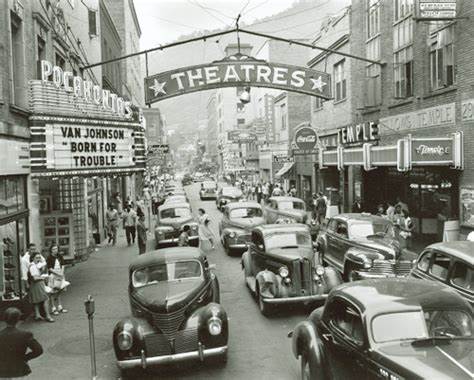Welcome to THE MAKING OF A NATION – American history in VOA Special English. I'm Steve Ember. World War Two finally ended in August of nineteen forty-five. Life in the United States began to return to normal. Soldiers began to come home and find jobs. Factories stopped producing war materials and began to produce goods for peacetime. At the same time, other changes began to take place in society. Many Americans were no longer satisfied with their old ways of life. They wanted something new and better. And many were now earning enough money to find that better life.
Millions of Americans moved out of cities and small towns. They bought newly built homes in suburban communities outside busy cities. Today, we look at the growth of suburbs and other changes in the American population in the years after World War Two. "And we'll have the living room right in here, and the kitchen right here so we can see the children playing in the yard." "Yeah, the children ... Children? Say, how many are you planning on? Not more than six, I hope. Maybe I better add a few more rooms back here." A married couple in a marketing film for the home building industry. The United States counts its population every ten years. The first census took place in seventeen ninety. At that time, the country had about four million people. One hundred years later, in eighteen ninety, the population was sixty-three million.
By nineteen fifty, there were more than one hundred fifty million people living in the United States. In the early years of America, the average mother had eight to ten children. Living conditions were hard. Many children died at an early age. Families needed a lot of help on the farm. So it was good to have many children. But over the years birth rates fell. Families began to have fewer and fewer children. By nineteen hundred, the average woman had only three or four children. In nineteen thirty-six, during the Great Depression, the average American mother gave birth to only two children. Things changed after World War Two. Suddenly, it seemed like every family started having babies. Parents were hopeful about the future.

There were lots of jobs. People felt the need for a family and security after the long, difficult years of the war. From nineteen fifty to nineteen sixty, the number of children between the ages of five and fourteen increased by more than ten million. The increase in births after the war produced what became known as the baby boom generation. An estimated seventy-eight million Americans were born between nineteen forty-six and nineteen sixty-four. Many of the new parents moved to homes in the new suburbs built outside the urban environment of cities. Usually a developer would buy land, maybe from a farmer, then clear it, level it and build houses on it. Young families would buy the houses with money that they borrowed from local banks.
Life was different in the suburbs – calmer, less crowded than life in the big city. There were all sorts of group activities. There were Boy Scouts and Girl Scouts. Parent-Teacher Associations at school. Outdoor cooking where families gathered in someone's backyard to eat hamburgers hot off the grill. Historian William Manchester described life in the suburbs in this way: The new suburbs were free, open, and honestly friendly to anyone except black people, whose time had not yet come. Manchester wrote, Families moving in found that their new friends were happy to help them get started. Children in the suburbs exchanged toys and clothing almost as though they were group property. When little Bobby outgrew his clothes, his mother gave them to little Billy across the street. People felt safe enough to leave their doors unlocked.
Parents did everything they could to make life good for their children. Between nineteen fifty and nineteen sixty, the number of boys playing on Little League baseball teams increased from less than one million to almost six million. The number of Girl Scouts increased by two million. Bicycle sales doubled. And it wasn't just two-wheeled transportation that experienced a boost. US new car production was stopped during World War Two, to allow those factories to produce airplanes, tanks, and other military vehicles for the war effort. With the prosperity of peacetime, many Americans visited auto dealerships for the first time in years, to replace that tired family car with something more up to date -- even luxurious. For many years, popular singer Dinah Shore invited optimistic post-war Americans to take to the highway and see their country in a Chevrolet.











